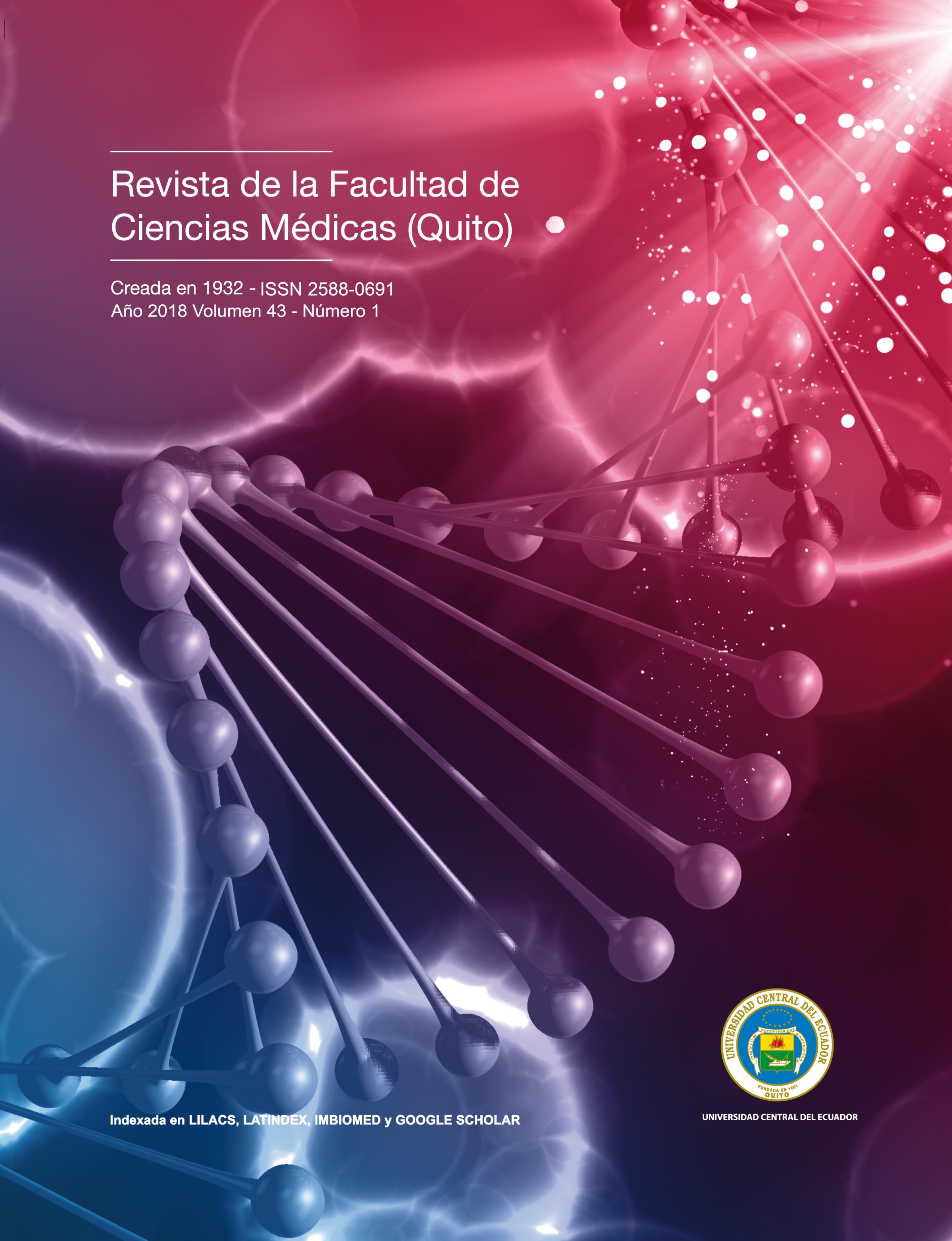Evolución normativa e histórica de la enseñanza de las especialidades médicas en la Facultad de Ciencias Médicas
DOI:
https://doi.org/10.29166/ciencias_medicas.v43i1.1458Keywords:
Higher education, Field of health, postgraduate programs, Medical specializations, Degree, Cohort, Faculty of Medical Sciences, Central University of EcuadorAbstract
Context: this summary cover the Integral Comprehensive Health Care Model in the field of Family, Community and Intercultural health (MAIS-FCI), the planned response in offer of postgraduate programs of the Faculty of Medical Sciences of the UCE, according to the needs of the National Health System (SNS) and, anchored to the Higher Education System and its legal framework.
Objective: to analyze the historical behavior of the postgraduate programs in the Faculty of Medical Sciences of the Central University of Ecuador, in which aspects related to national and international appropriatness are related, from a legal and factual context that includes the chronological milestones of the academic institutionalization of training and certification; as well as its strengthening and projection.
Methods: bibliographic, documentary, descriptive, observational, quantitative and qualitative study.
Results: the Faculty of Medical Sciences at Central University was created in 1693. In 1972, the first medical specialty program in Gynecology and Obstetrics was founded, in response to the high prevalence of maternal and child morbidity and mortality; then Internal Medicine in 1973, Pediatrics in 1974, Orthopedics and Traumatology in 1975. The postgraduate institutionalism is anchored to the Department of Graduates (1972-1986), Graduate School (1987-1997) and Higher Institute of Postgraduate Studies (1998-2017). ). Since its creation, 31 programs have been offered in medical specializations, 8 specialization programs in nursing, 10 master's programs and 16 health Diplomates.
Discussion: the Faculty of Medical Sciences have graduated from 5.307 professionals in 65 academic programs; has executed 505 cohorts with a duration of up to 4 years; the emblematic programs are Internal Medicine and Gineco-Obstetrics (31 cohorts) and Pediatrics and Anesthesiology (29 cohorts). By 2017, 24 medical specialization programs are in operation, with 715 postgraduate students and 567 teachers. In the future and responding to the global and national context, it proposes to implement a quality management system, accredit graduate programs according to the new legal regulations in force, and internationalize them. Maintaining the "traditional" medical specializations, it is proposed to promote the creation of new medical specializations, of nursing, of obstetrics and others of the specific field of health. The educational, pedagogical and curricular models will be strengthened in relevance, for a profoundly humanistic formation of postgraduates, with academic quality and excellence, including scientific research that will generate the publication of scientific literature.
Conclusion: the postgraduate training of the Faculty of Medical Sciences is historical, leading and a pioneer in Ecuador, for the performance of human talent in the field of health, which has contributed to the construction of solutions to health problems of the population, in contribution to exercise the right to health in conditions of quality and warmth
Downloads
Metrics
References
Yépez R. La formación de los Médicos en el Ecuador en los últimos cincuenta años 1960-2010.
Conferencia Internacional sobre Atención Primaria de Salud, Alma-Ata, URSS, 6-12 de septiembre de 1978
MSP, Modelo de Atención Integral en Salud, Familiar, Comunitario e Intercultural MAIS-FCI. Subsecretaría Nacional de Gobernanza de la Salud Pública. Dirección Nacional de Articulación del SNS y Red, Ecuador 2012
Noboa E. Reseña Histórica sobre el curso de posgrado ginecología y obstetricia de la Universidad Central del Ecuador. Revista Ecuatoriana de Ginecología y Obstetricia Volumen. 22-No.1
ONU. Objetivos de Desarrollo Sostenible ODS, septiembre 2015
ONU. Objetivos de Desarrollo del Milenio ODM, septiembre 2000
ONU. Estrategia Mundial de Recursos Humanos para la salud hasta el 2030, 69.a Asamblea Mundial de la Salud, mayo de 2015
OPS. Consulta Regional recursos humanos en salud: desafíos críticos. Reunión regional de los Observatorios de Recursos Humanos en salud. Toronto Canadá, 2005
MSP. Metodología para la planificación del talento humano en establecimientos de salud de acuerdo a la tipología, nivel de atención y complejidad, para la Red Pública Integral en Salud, Instructivo. Primera edición. Dirección Nacional de Normatización de Talento Humano en Salud, Subsecretaría Nacional de Gobernanza de la Salud Pública. Quito; 2017. Montalvo, G. Mieles, A. Pintado, S. Yar, J. http://salud.gob.ec
Corporación de Estudios y Publicaciones. Constitución de la República del Ecuador. Talleres de la Corporación de Estudios y Publicaciones. (2008). 229-230
Enríquez G. Diseño de proyectos. Instituto de Altos Estudios Nacionales (IAEN). Colección NE (Nuevo Estado). Quito: Imprenta Mariscal. (2013). 14
Barros T. Indicadores de calidad educativa en centros escolares del Distrito Metropolitano de Quito y propuesta de un modelo de calidad pertinente para Ecuador. Donostia-San Sebastián. 2012. 329-233
Morín E, Roger E, Domingo R. Educar en la era planetaria. El pensamiento complejo como método de aprendizaje en el error y la incertidumbre humana. Grupo Santillana S.A., 2005. Quito
Garita Bonilla L. Nuevas perspectivas para la innovación de la gestión universitaria en América Latina. En: La educación superior en el siglo XXI Visión de América Latina y el Caribe, Tomo II. Colección Respuestas Ediciones CRESALC/UNESCO. Caracas. 1997. 710-711
Real Academia de la Lengua. Diccionario esencial de la lengua española. España Calé S.A. Madrid. 2006. 986
Rosero M. El día en que los ángeles perdieron las alas, Guía para la implementar un Sistema de Calidad ISO 9000 en la educación primaria, media y universitaria. DIGIDOC. Quito. 2004. 35-39.










